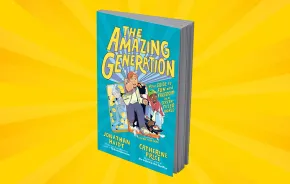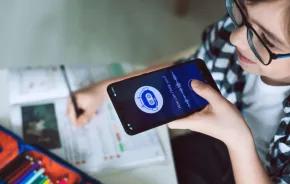
Can an app help kids learn to focus, concentrate and even get calm? That’s the premise behind the Catherine Mayer Foundation’s new “un-app,” titled L.A.U.G.H. (Let Art Unleash Great Happiness). L.A.U.G.H. was developed by artist Catherine Mayer, who set out a few years ago to create an app that would replicate the benefits of the process of art making in children. She noticed that when she created a multi-sensory experience combining art, breathing and music, kids focused and became creative.
L.A.U.G.H. app details
The app is for ages 4 and older and can be downloaded for the iPad
"I wanted to make a screen a respite or positive learning experience,” says Mayer.
Mayer worked with UpTop, an app development firm, to create and design L.A.U.G.H., which you can download onto an iPad (it's not currently available for iPhones). As the app moved into final development, Mayer worked with Dr. Dimitri A. Christakis, director of the Center for Child Health within Seattle Children’s Hospital, to begin testing the app's impact on children, and whether it helped improve focus.
The study, which compared physiological data from children ages 7-13 using the L.A.U.G.H. App with kids who used a standard entertainment app, found results supported Mayer's hypothesis: “Our preliminary data demonstrated that children using The L.A.U.G.H. App exhibited much greater concentration than when using comparable entertainment apps,” says Christakis.
Kids using the app also showed greater cognitive engagement and lower heart rate variability (a sign of increased focus and concentration).
Test-driving it on my child
Skeptical? I was. But I went ahead and downloaded it for my 7-year-old son to try.
A jingle began upon opening the app, followed by the appearance of a cartoon ant appears who introduced itself as Ambi Ant. My son was elsewhere in the house, but his senses must have tingled because he was standing next to me before the completion of the intro. He asked what it was, and I simply handed over the iPad and observed.
The app gives you the choice between going on an adventure or skipping to a free drawing activity. My son chose the adventure, which began with Ambi-led breathing exercises, followed by a guided contour drawing activity (Ambi led him in drawing items such as a goldfish and a butterfly, which helps kids understand shapes and learn to breathe). After that, he tried the free drawing part of the app, which lets kids choose an image and to draw their own version of it, using a variety of colors. Kids can choose between pencil, crayon, chalk or pen (and there's an eraser for editing).
He was initially engaged by the app. But to test whether the app could help him focus, relax and concentrate I started having him use the app before two of his biggest meltdown triggers: homework time and heading to school in the morning.
Each morning before leaving the house, I asked him to get on the app for seven to ten minutes, and again before starting his homework. Using the app has helped him better cope with these events. He transitions more calmly and complains less. This isn't a scientific study, and by no means a conclusive result, but I’m ready to call this app, or "un-app," as Mayer refers to it, a winner.
The app isn't perfect: My son's initial interest has waned: His biggest complaint is that there’s only one adventure to choose from. Mayer does say that another adventure is in the works, which may incorporate geography, animation and a variety of music.
Stay tuned for more research: The L.A.U.G.H. app will soon be part of a pilot program in partnership with Seattle’s Madrona Elementary School and the University of Washington College of Education.
More apps that might help kids get to calmThere are thousands of apps in the iTunes store that claim to help with focus and relaxation. Here are few that are the most promising for kids and families. Breathe, Think, Do, with Sesame by Sesame Workshop: Made for ages 5 and under, this app is intended to help your child with problem solving, self control and task persistence. The app takes your child through everyday frustrations and helps them learn to deal with it by taking deep breaths and calming down. Cogmed by Pearson Education: This app claims to help improve working memory, attention and even academic performance. It’s recommended for children above 5 years of age and takes them through a series of game-like challenges. Focus on the go! by University of California: Created to support the FOCUS (Families Over Coming Under Stress) resilience training model, this app helps parents and children calm down and identify emotions through videos and activities. |











